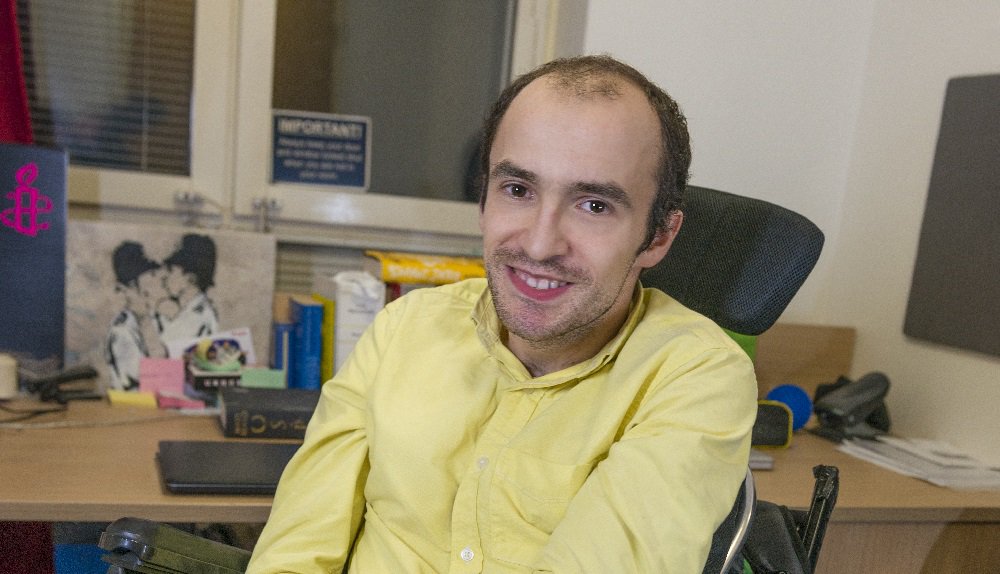‘Stigma can stifle a sex life as much as any disability’
By Will Stroude

Due to many years of poor media representation and an ill-founded presumption that disabled people are either asexual or cannot physically perform the act, those living with disability often find it harder to find a sexual partner, be it a relationship or a fleeting encounter. This makes me sad.
Some sex workers feel they can fix this. They offer services to disabled people. But is this an answer or does this just perpetuate inequalities even more? The very fact that society perceives a body that is not impaired to be worth paying for by someone physically impaired seems to be doing very little to progress equality.
Under the ‘social model’, people with impairments are only disabled by society. An example of a disabling factor in this case is prejudice, which is entirely human-made. The very notion of a disabled person giving up money to have sex with someone who isn’t does nothing in favour of this model.
In opposition to the social model is the ‘charity model’, which suggests that disability is something that should be felt sorry for and seen as a hindrance – it should be pitied and disabled people should be on the receiving end of charitable gifts. In turn, this model refuses to acknowledge the autonomy or equality disabled people have.
By paying for sex, the charity model is reinforced. While there is currently much debate over racism on Grindr, one would be completely absurd to suggest it could be solved by black men paying to sleep with white men. This example cannot be completely representative, but it does highlight some issues with sex workers and disabled clients.
There are more complications. Sex is healthy, and people with muscle spasms from cerebral palsy can greatly benefit from orgasm, just as much as non-disabled people. Equally, because these people have muscle spasms, they often cannot masturbate themselves.
Could there ever be a service to provide such a role in a non-romantic way? There is no clear answer. Orgasm requires arousal. The very notion of another person helping someone orgasm infers that there must be some arousal for the person being helped. There are sex therapists and body workers who help clients become more confident with their bodies with the aim of helping them find their own long term partners. Some may find this more empowering. Should any of this ever be paid for by the state in the same way that personal care needs are met such as help using the toilet and feeding?
On a deeper level, for people who are vulnerable and want to pay for more romantic sex, do they develop unrequited feelings towards the sex worker? Good sex only occurs when there is a deep connection and some sex workers hope for repeat work. One would presume that a sex worker could set very clear boundaries. However, in order to see clients again, it is possible to see why they would allow some form of romantic attachment to form between them and the client. People who are vulnerable may find the dynamic of this relationship difficult.
On the other side, the sex work debate continues. I see why the voice of clients is always silenced. However, given disabled people’s standing in society, can they really oppress and abuse sex workers? For many disabled people, it is a double blow. They are desexualised and sometimes cannot masturbate. The debate on prostitution often revolves around whether a fully-liberated woman can ever consent to selling her body to a rich, male, non-disabled client.
To what extent does this change when the client is extremely vulnerable? What if the client wants a male sex worker? Can perspectives of oppression be applied to a man who wants to sell his body? I don’t think that the very classic arguments can be applied to these situations.
While it is acknowledged by many that in a perfect society women would not be oppressed and need to sell their bodies, the same can be said for disabled people who would not be seen as any less attractive and would not need to involve money in something so personal.
If disabled people were treated equally, they would not need to pay for sex.
Josh Hepple is a London-based law graduate, writer, campaigner. Follow him on Twitter @JoshuaHepple and online joshhepple.com.
You can discover more about the myths surrounding sex and disability in Attitude’s Body Issue, available to download and in shops now. Available internationally from newsstand.co.uk/attitude.

More stories:
How Instagram became the new gay cruising ground
‘There’s more to me than just a body’ – Tom Daley dives into Attitude’s Body Issue
